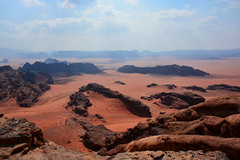
Iraqi soldier in the markets of Karbala
https://www.flickr.com/photos/98070911@N05/16446372336/
“We neither need sympathy nor denunciations; we need better weapons and more ammunition!” – Haidar, an Iraqi soldier keeping an eagle’s eye on a busy market in Kadimiya, a district located northern Baghdad, while replying to the merchants’ salutations as he walks by their small colorful shops, which covered the atmosphere with the scent of spices and Arabian musk. “We are strong, but we’re exhausted as well (..) it takes one day to assemble forces and launch an attack on terrorism”, implying to the fact that none of the Arab nations have come to aid Iraqis against the threat of the Islamic State in Iraq and Levant “ISIL”, unlike what is happening nowadays in Yemen
A Saudi-led aerial assault hit Yemeni capital, Sanaa, alongside other Houthi-controlled areas, after Yemeni president Abed Rabbu Mansour’s request to “protect Yemen from Houthis”; but why haven’t the 10 participating Arab and Asian nations did the same thing when ISIL conquered much of Western Iraq and North-Eastern Syria?
Probably the answer lies in the Bab el Mandeb, the world’s most strategic and profitable strait, found in the southwest of the Arabian Peninsula. Almost 3,300,000 oil barrels pass daily through that very strait, which is equivalent to 4% of global demand, as well as 21,000 trade vessels annually, which is 10% of global trade shipment movements. Once Houthis have reached the provinces surrounding Bab el Mandeb, Saudis have declared war against Houthis and stated that it is a case of “national security and interests”, without giving any sort of hard evidence proving so, probably because Saudis would not want another strait controlled by “the enemy”, such the Iranian-controlled Strait of Hormuz in the Persian Gulf
Moreover, Houthis have sufficed for solely rejecting Saudi interference in Yemeni affairs; ISIL leaders have recently stated that Saudi Arabia is a target-country, urging its followers in the kingdom to target economical institutes and social gatherings. Even before that, assassinated al-Qaeda leader in Yemen Anwar al-Awlaki has repeatedly called for attacks against Saudi Arabia for the latter’s cooperation with “the imperialist powers against the Islamic Umma”
Another answer might be found in the oil wells of Iraq and Syria. So far, ISIL has been indirectly serving the Saudi oil monopoly and trade – Saudi Arabia has 18% of petroleum reserves and prominent petroleum exporter worldwide – in face of other regional rivals, especially Iraq, which has the fifth largest oil reserves, yet the terrorist group controls a big portion of the oil wells
The third answer is in the ideological and religious closeness of ISIL and Saudi Arabia’s religious authority. Unlike Houthis, whom are Yazdi-Shiites of the Islamic religion, ISIL and Saudi Arabia’s religious authority share many methods of internal governance, such rule of Wahhabist law, forcing women to wear burqa’, imprisoning activists for charges of defamation of royalty or religious figures; though they slightly differ in political goals – each wants a pan-Islamic governance for itself.






